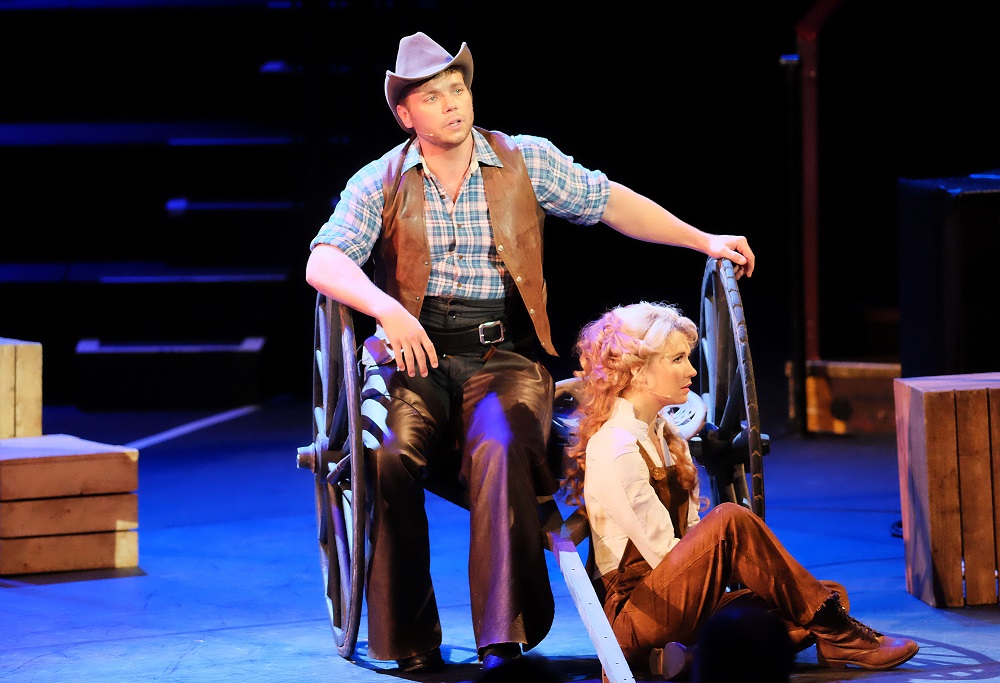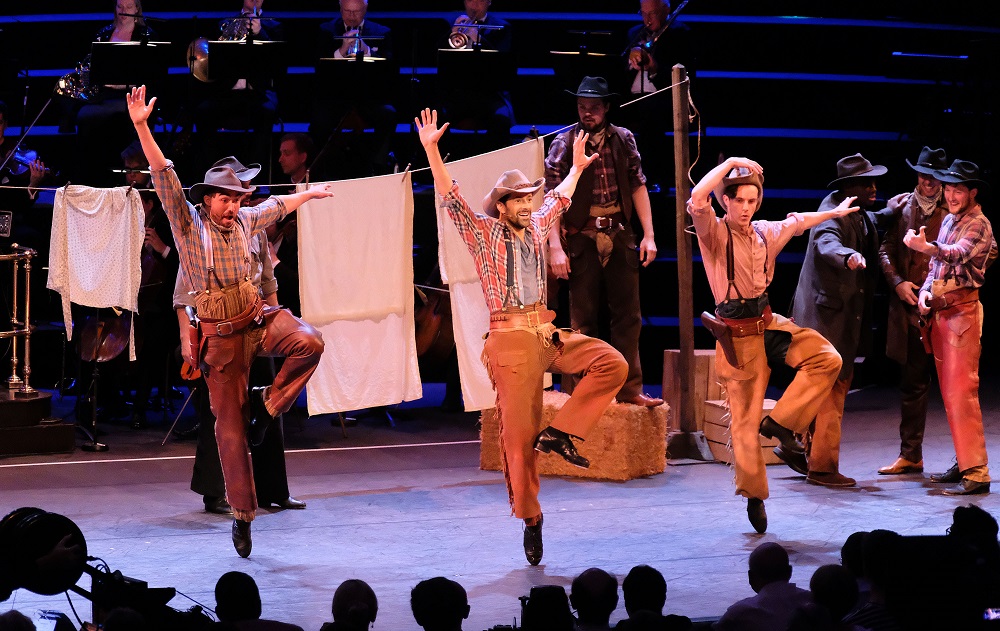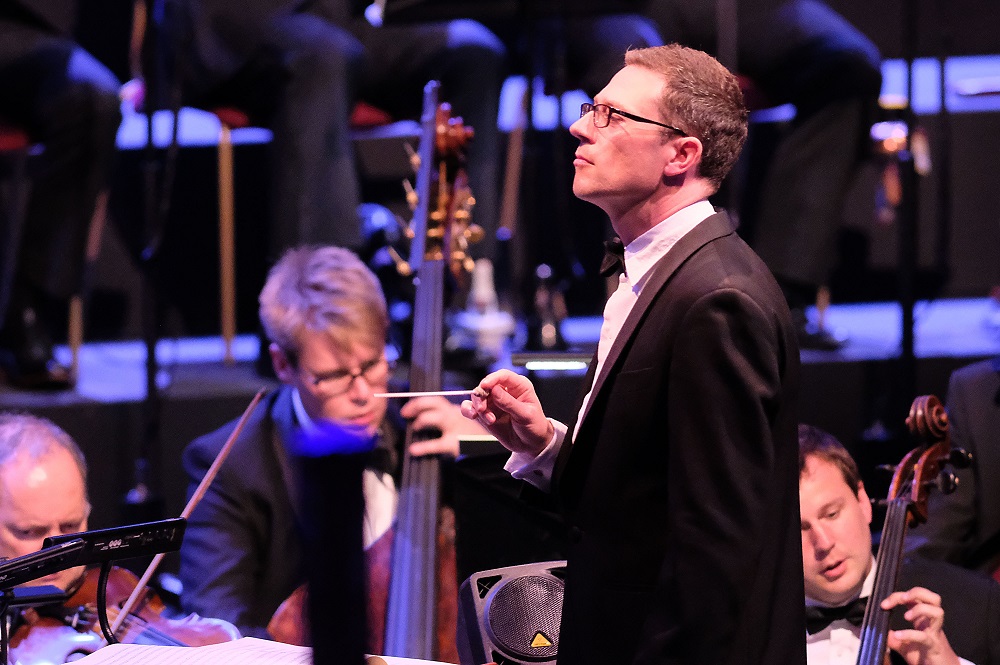Proms 34 & 35 review: Oklahoma!, John Wilson Orchestra - music triumphs, words and drama suffer | reviews, news & interviews
Proms 34 & 35 review: Oklahoma!, John Wilson Orchestra - music triumphs, words and drama suffer
Proms 34 & 35 review: Oklahoma!, John Wilson Orchestra - music triumphs, words and drama suffer
Lopsided results in faithful reconstruction of Rodgers and Hammerstein's groundbreaker
Only one thing could equal the "wow!" factor of seeing and hearing a youngish Hugh Jackman launch into “Oh, What a Beautiful Mornin’“ at the start of the National Theatre’s 1998 staging of Oklahoma!: John Wilson and his orchestra trilling and swooning their perfectly-balanced way through the Overture at the Proms
Much has been written – including in the programme – about the apple-pie wholesomeness of Oscar Hammerstein II’s lyrics after those of Rodgers’ more acidic former collaborator Lorenz Hart. But is that such a good thing? They eventually get an upset, but not until we’ve had reams of Hicksville cuteness and we wonder when and if the plot is going to start. Great melodies, sure, but good drama? You rooted, of course, for Nathaniel Hackmann’s walk-the-bow-legged-walk cowman Curly: less of a looker than Jackman, but with the perfect, suave, post-Howard-Keel baritone of a voice. Less so, perhaps, for Scarlet Strallen’s Laurey, who’s crazy for him but won’t admit it: she’s a fine and sympathetic actor, but years of taking the chest voice high in the musicals don’t allow a sweet lyric-soprano top (the two pictured below). The first dance sequence, for “Kansas City”, is a winner as a result (pictured below), but choreographer Alastair David doesn’t go much beyond the stock thereafter, despite homages to the original work by Agnes de Mille. That was a drawback when you’ve got a climactic quarter-of-an-hour dream sequence at the end of the first act (good fight scene, though). Musically, it’s mostly reprises, with one startling dissonant transformation of Curly’s niceness towards the end. Jud’s “Lonely Room” with its clashing semitones in the clarinets and David Seadon-Young vocally yearning in a not unsympathetic way sets up potential for the character to be further developed (I wonder if Britten, with his focus on the outsider, knew Oklahoma!). Unfortunately it isn’t, not musically at least, and the Act Two structure is uncomfortable. “The Farmer and the Cowman” is a lively divertissment at the start, very well done here, but you can’t feel relaxed about the title song knowing that the denouement is long overdue. Jud dies – no spoiler there – and after a dodgy acquittal of Curly for his accidental knifing of his opponent, the married couple can depart for their honeymoon in the surrey with the fringe on top. In short, everyone acted, sang, played and danced their cotton socks off, and the pass-remarkable, singalong audience members around me loved every minute, though I suspect that folk watching live on TV or listening on the radio heard a lot more of the words than we did. I'd still like to see Oklahoma! done chamber-style, following the runaway successes of the Arcola Carousel and the Young Vic's Annie Get Your Gun. Amplification was certainly better than in last year’s disastrously miked Fiddler on the Roof, at least allowing the timbre of the voices to emerge, but it was still a bit of a blur. One very good reason for having surtitles even when the text is nominally Oklahoma English. Unfortunately the successful experiment for Khovanshchina was a one-off; the Proms won’t be using them again this season. Write to the BBC if you think that’s a cop-out.


Add comment
The future of Arts Journalism
You can stop theartsdesk.com closing!
We urgently need financing to survive. Our fundraising drive has thus far raised £49,000 but we need to reach £100,000 or we will be forced to close. Please contribute here: https://gofund.me/c3f6033d
And if you can forward this information to anyone who might assist, we’d be grateful.

Subscribe to theartsdesk.com
Thank you for continuing to read our work on theartsdesk.com. For unlimited access to every article in its entirety, including our archive of more than 15,000 pieces, we're asking for £5 per month or £40 per year. We feel it's a very good deal, and hope you do too.
To take a subscription now simply click here.
And if you're looking for that extra gift for a friend or family member, why not treat them to a theartsdesk.com gift subscription?
more Theatre
 Othello, Theatre Royal, Haymarket review - a surprising mix of stateliness and ironic humour
David Harewood and Toby Jones at odds
Othello, Theatre Royal, Haymarket review - a surprising mix of stateliness and ironic humour
David Harewood and Toby Jones at odds
 Macbeth, RSC, Stratford review - Glaswegian gangs and ghoulies prove gripping
Sam Heughan's Macbeth cannot quite find a home in a mobster pub
Macbeth, RSC, Stratford review - Glaswegian gangs and ghoulies prove gripping
Sam Heughan's Macbeth cannot quite find a home in a mobster pub
 The Line of Beauty, Almeida Theatre review - the 80s revisited in theatrically ravishing form
Alan Hollinghurst novel is cunningly filleted, very finely acted
The Line of Beauty, Almeida Theatre review - the 80s revisited in theatrically ravishing form
Alan Hollinghurst novel is cunningly filleted, very finely acted
 Wendy & Peter Pan, Barbican Theatre review - mixed bag of panto and comic play, turned up to 11
The RSC adaptation is aimed at children, though all will thrill to its spectacle
Wendy & Peter Pan, Barbican Theatre review - mixed bag of panto and comic play, turned up to 11
The RSC adaptation is aimed at children, though all will thrill to its spectacle
 Hedda, Orange Tree Theatre review - a monument reimagined, perhaps even improved
Scandinavian masterpiece transplanted into a London reeling from the ravages of war
Hedda, Orange Tree Theatre review - a monument reimagined, perhaps even improved
Scandinavian masterpiece transplanted into a London reeling from the ravages of war
 The Assembled Parties, Hampstead review - a rarity, a well-made play delivered straight
Witty but poignant tribute to the strength of family ties as all around disintegrates
The Assembled Parties, Hampstead review - a rarity, a well-made play delivered straight
Witty but poignant tribute to the strength of family ties as all around disintegrates
 Mary Page Marlowe, Old Vic review - a starry portrait of a splintered life
Tracy Letts's Off Broadway play makes a shimmeringly powerful London debut
Mary Page Marlowe, Old Vic review - a starry portrait of a splintered life
Tracy Letts's Off Broadway play makes a shimmeringly powerful London debut
 Little Brother, Soho Theatre review - light, bright but emotionally true
This Verity Bargate Award-winning dramedy is entertaining as well as thought provoking
Little Brother, Soho Theatre review - light, bright but emotionally true
This Verity Bargate Award-winning dramedy is entertaining as well as thought provoking
 The Unbelievers, Royal Court Theatre - grimly compelling, powerfully performed
Nick Payne's new play is amongst his best
The Unbelievers, Royal Court Theatre - grimly compelling, powerfully performed
Nick Payne's new play is amongst his best
 The Maids, Donmar Warehouse review - vibrant cast lost in a spectacular-looking fever dream
Kip Williams revises Genet, with little gained in the update except eye-popping visuals
The Maids, Donmar Warehouse review - vibrant cast lost in a spectacular-looking fever dream
Kip Williams revises Genet, with little gained in the update except eye-popping visuals
 Ragdoll, Jermyn Street Theatre review - compelling and emotionally truthful
Katherine Moar returns with a Patty Hearst-inspired follow up to her debut hit 'Farm Hall'
Ragdoll, Jermyn Street Theatre review - compelling and emotionally truthful
Katherine Moar returns with a Patty Hearst-inspired follow up to her debut hit 'Farm Hall'
 Troilus and Cressida, Globe Theatre review - a 'problem play' with added problems
Raucous and carnivalesque, but also ugly and incomprehensible
Troilus and Cressida, Globe Theatre review - a 'problem play' with added problems
Raucous and carnivalesque, but also ugly and incomprehensible

Comments
For those of us housebound
My husband and I were amazed
Critics are professional
I think this is an excellent,
I watched on TV and thought
Well I thought it was
The problem with the Urtext
I can rarely concentrate on
Thanks for a range of
Thanks for a range of comments. I fear several have either missed most of my points about the energy of the cast, and some have repeated what I've written while thinking I stated the opposite. I'm bound to report on the event from where I experienced it, and that was slightly to the side where the words were often indistinct to both myself, my companion and several others I spoke to.
My other beef was with the 'Urtext', and a commenter above echoes me on that. Way too much dialogue and situations - the 'bartered bride' auction stuff at the 'do', for instance - which others seem to have found funnier than I did.
I would have hoped that an attempt to address the full show that is Oklahoma! as well as the performance might have encouraged more debate about the nature of the work, the oddities and flaws of which took me by surprise (I'm so fond of the film, and I enjoyed the National Theatre production unreservedly). But it seems as if I'm being taken to task for undervaluing the performers, which isn't the case. And the point about the chest voice taken high was that the role of Laurey absolutely doesn't require this, nor did Ms Strallen try it. The alternative felt uncomfortable to me.
Beware of fandom?
I was at the RAH (for Prom 35
Watched it on iPlayer last